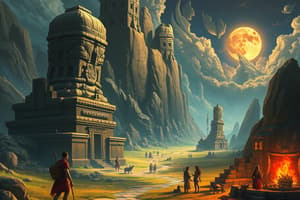Podcast
Questions and Answers
Which early hominid species emerged around 4 million years ago?
Which early hominid species emerged around 4 million years ago?
- Homo erectus
- Neanderthals
- Australopithecus (correct)
- Homo sapiens
What development in prehistoric humans occurred earlier than previously believed?
What development in prehistoric humans occurred earlier than previously believed?
- Domestication of animals
- Use of advanced weaponry
- Establishment of formal education systems
- Development of complex social structures (correct)
Which ancient civilization is credited with the invention of paper, the wheel, and gunpowder?
Which ancient civilization is credited with the invention of paper, the wheel, and gunpowder?
- Mesopotamia
- India
- China (correct)
- Greece
Where did Western philosophy, science, and democracy have their roots according to the text?
Where did Western philosophy, science, and democracy have their roots according to the text?
Which ancient civilization introduced writing systems and the concept of city-states?
Which ancient civilization introduced writing systems and the concept of city-states?
What was a significant development during the Renaissance period?
What was a significant development during the Renaissance period?
Which philosopher was associated with the Enlightenment period?
Which philosopher was associated with the Enlightenment period?
What was a defining factor of the modern era?
What was a defining factor of the modern era?
Which explorer is known for his circumnavigation of the globe?
Which explorer is known for his circumnavigation of the globe?
What did the Enlightenment philosophers seek to improve based on reason and individual rights?
What did the Enlightenment philosophers seek to improve based on reason and individual rights?
Flashcards are hidden until you start studying
Study Notes
Discovering Our Past: A Journey through Human History
Human history is a vast tapestry woven from countless threads — stories of love, conflict, innovation, and triumph spanning millions of years. As we trace our collective journey, let's delve into some pivotal moments and themes that have shaped who we are today.
Early Hominids and Prehistoric Humans
Our adventure begins long before recorded history with the emergence of early hominids such as Australopithecus around 4 million years ago. These ancestors gradually evolved into more sophisticated human species like Homo habilis, Homo erectus, and eventually Homo sapiens. Archaeological evidence suggests these prehistoric humans began using tools and developing complex social structures thousands of years earlier than previously thought.
Ancient Civilizations
Fast forward, and we encounter several ancient civilizations whose legacy lives on even now. From Egypt's grandiose pyramids and intricate hieroglyphs, to Mesopotamia's discovery of writing systems and the first city states, each civilization made unique contributions to humanity. Also notable was China's invention of paper, the wheel, and gunpowder; India's development of mathematics, astronomy, and philosophy; Greece's birthplace of Western philosophy, science, and democracy; and Rome's empire encompassing much of Europe, North Africa, and Asia Minor.
Middle Ages & Renaissance
The Middle Ages were marked by feudalism and the power struggles among kingdoms. In this period, significant advances occurred in agriculture, technology, and trade. Eventually, the Renaissance emerged, ushering in a new era of exploration, artistry, and scientific advancement. This movement saw the likes of Leonardo da Vinci, Galileo Galilei, and Christopher Columbus leave indelible marks on world culture and knowledge.
Age of Exploration & Enlightenment
During the late Middle Ages and the following centuries, European nations raced to discover new lands and introduce global trade networks. Notable expeditions included Vasco de Gama's sea route to India, Amerigo Vespucci's explorations leading to America being named after him, and Captain James Cook's circumnavigation of the globe. During the Enlightenment, philosophers such as John Locke, Thomas Hobbes, and Voltaire sought to improve society based on reason and individual rights.
Modern Era
As the modern era progressed, industrialization, warfare, mass migration, technological breakthroughs, and ultimately global unity have been defining factors. Noteworthy events during this time include the Industrial Revolution, World Wars I and II, space travel, the Cold War, decolonization, feminist movements, the rise of information technology, and international cooperation toward sustainability efforts.
History continues to unfold daily; every generation contributes its own chapter, sometimes challenging the established narrative while upholding traditions. By exploring past eras and understanding their contexts, we gain a deeper appreciation of how societies evolve, learn from mistakes, innovate, and confront challenges. We stand on the shoulders of giants who came before, and it's within our reach to shape a better future for all humankind.
Studying That Suits You
Use AI to generate personalized quizzes and flashcards to suit your learning preferences.




